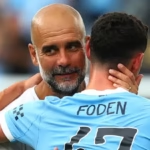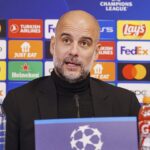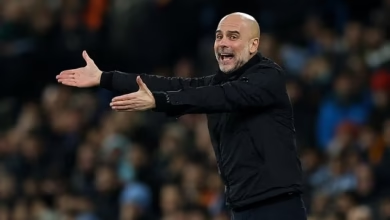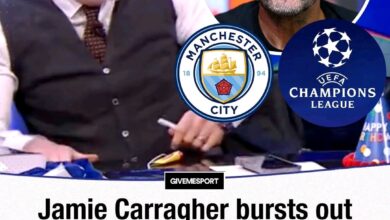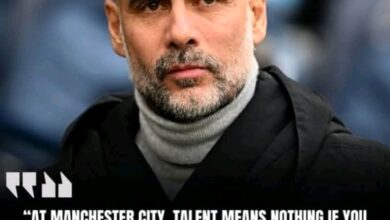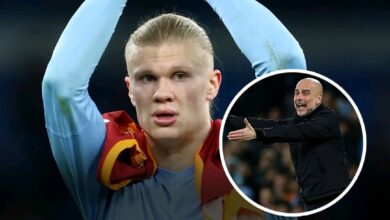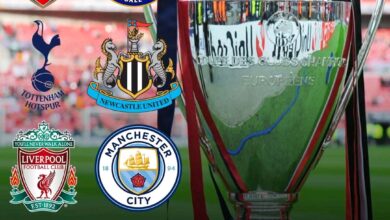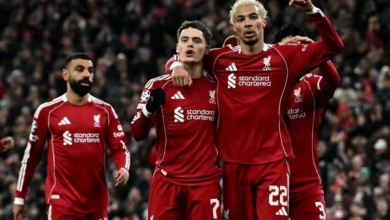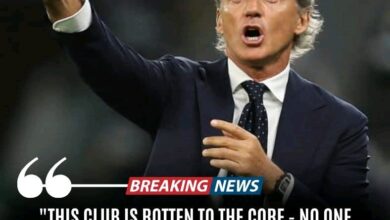Man City 2024-25 season ratings – every player ranked: From defiant Erling Haaland to floundering Phil Foden
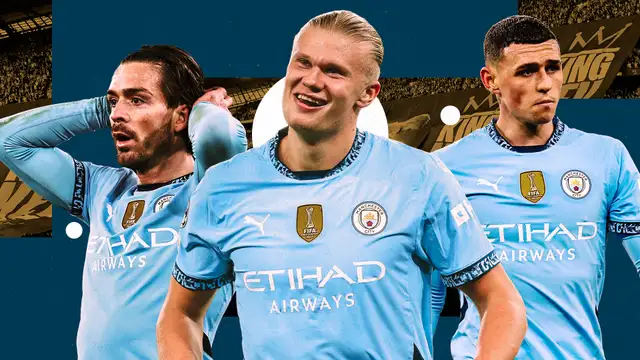
The 2024-25 season will forever be remembered as the year Pep Guardiola’s Manchester City empire finally crumbled. After years of unprecedented dominance in English football, the Citizens experienced their most turbulent campaign in over a decade, marking the end of an era that had seen them claim four consecutive Premier League titles.
What began as a promising pursuit of a fifth straight championship quickly devolved into a nightmare scenario that few could have predicted. City’s early season form suggested business as usual – seven victories from their opening nine league fixtures painted a picture of sustained excellence. However, the defeat at Bournemouth in November proved to be the catalyst for an unprecedented collapse that would define their entire campaign.
The statistics tell a sobering story. From their lofty perch atop English football, City plummeted to finish third with 71 points – their lowest tally under Guardiola and a staggering 20 points fewer than the previous season. The team that had become synonymous with consistency and excellence lost six out of eight league games between November and December, effectively handing the title to Liverpool before Christmas.
The Rodri Effect: When the Anchor is Lost
Perhaps no single injury has had such a devastating impact on a team’s fortunes as Rodri’s ACL tear against Arsenal in September. The Spanish midfielder had been the invisible engine driving City’s success, and his absence exposed the fragility that lay beneath their polished exterior. His Ballon d’Or triumph, accepted while on crutches, served as a poignant reminder of what City had lost.
Without Rodri’s metronomic passing and defensive intelligence, City’s midfield became a revolving door of makeshift solutions. The subsequent signings of Nico Gonzalez and Abdukodir Khusanov represented desperate attempts to fill the void, but neither could replicate the unique qualities that made Rodri irreplaceable.
European Humiliation and Domestic Disappointment
The Champions League campaign epitomized City’s struggles. After years of being considered among Europe’s elite, they nearly failed to qualify from the league phase of the reformed competition. When they finally scraped through, Real Madrid – their familiar tormentors – ended their European dreams in the knockout play-offs, marking their earliest exit from the competition in 12 years.
The FA Cup final defeat to Crystal Palace provided a fitting metaphor for the entire season. Despite reaching Wembley, City’s performance was characterized by the same lethargy and lack of cutting edge that had plagued them throughout the campaign.
Individual Player Analysis: A Season of Contrasts
The Standout Performers
Josko Gvardiol (8/10) – The Shining Light In a season where criticism was abundant, Gvardiol emerged as City’s most consistent performer. The Croatian’s £77 million price tag initially raised eyebrows, but his development into a world-class defender justified every penny. His versatility proved invaluable – excelling both as an attacking left-back and as a central defender when paired with Ruben Dias. Guardiola’s assessment that Gvardiol was “the most important player we’ve had this season” speaks volumes about his impact during City’s darkest hours.
Erling Haaland (7/10) – The Relentless Goalscorer Despite the chaos around him, Haaland continued to demonstrate why he’s considered one of the world’s premier strikers. His record-breaking start – 10 goals in five games – reminded everyone of his extraordinary ability. While his team-mates struggled, Haaland shouldered the goalscoring burden almost single-handedly, reaching 30 goals for the third consecutive season. His foot injury in March derailed his Golden Boot ambitions, but his commitment never wavered.
Omar Marmoush (7/10) – The January Salvation The Egyptian’s arrival provided a much-needed spark during the winter transfer window. His immediate impact, including a hat-trick against Newcastle in just his third appearance, offered hope that City could salvage their season. While he missed the crucial penalty in the FA Cup final, his overall contribution helped ease the pressure on Haaland and demonstrated the quality of player City needed to target in the transfer market.
Nico O’Reilly (7/10) – The Unexpected Hero Perhaps no player better embodied City’s season of surprises than the young Irishman. Unknown to most fans at the season’s start, O’Reilly’s emergence as a genuine first-team contributor provided one of the few positive storylines. His performances in the FA Cup, particularly his brace against Plymouth, showcased a maturity beyond his years. His adaptability – playing effectively at left-back and in midfield – marked him as a player with a bright future.
The Solid Contributors
Mateo Kovacic (6/10) – The Steady Influence The Croatian midfielder’s second season at City proved his worth as a reliable squad player. His six Premier League goals represented an unexpected attacking contribution, while his midfield stability became even more valuable in Rodri’s absence. His dominant performance in the FA Cup semi-final against Nottingham Forest reminded everyone of his quality at the highest level.
Ilkay Gundogan (6/10) – The Aging Warrior The German’s return from Barcelona initially seemed like shrewd business, but Father Time remained undefeated. While his experience and leadership proved valuable, his declining physicality became increasingly apparent, particularly when asked to anchor the midfield. His bicycle kick at Fulham provided a reminder of his technical excellence, but such moments became increasingly rare.
Bernardo Silva (6/10) – The Fading Star Perhaps no player’s decline was more symbolic of City’s overall struggles than Silva’s disappointing campaign. The Portuguese midfielder, long considered one of the Premier League’s most consistent performers, appeared to lose the intensity and drive that had defined his previous seasons. His reduced pressing and overall energy levels contributed to City’s midfield struggles throughout the campaign.
The Disappointments
Phil Foden (4/10) – The Fallen Golden Boy The most shocking individual decline belonged to the previous season’s Player of the Year. Foden’s drop from 27 goals to just 10 represented far more than statistical regression – it symbolized the loss of the spark that had made City so dangerous. His later revelation about mental health struggles provided context for his performances and highlighted the human side of professional football’s pressures.
Jack Grealish (3/10) – The Expensive Enigma Guardiola’s warning to Grealish about needing to improve proved prophetic as the winger endured his worst season in over a decade. With just one goal and one assist from seven league starts, his £100 million price tag became an increasingly uncomfortable reminder of misplaced investment. Being overlooked for the FA Cup final in favor of debutant Claudio Echeverri served as the final indignity in a forgettable campaign.
Kyle Walker (3/10) – The Aging Speedster The veteran right-back’s dramatic decline epitomized how quickly fortunes can change in football. Once the Premier League’s most reliable defender, Walker’s pace and positioning deserted him at crucial moments. His humiliation at the hands of Milos Kerkez at Bournemouth and Timo Werner’s pace in the 4-0 Tottenham defeat highlighted his vulnerabilities. His January loan move to AC Milan felt like a mercy for all parties involved.
The Injury Casualties
Several players saw their seasons effectively ended by fitness issues. John Stones’ persistent injury problems led to Guardiola’s public frustration, with the manager stating bluntly that “you can’t perform if you aren’t reliable.” Nathan Ake’s various ailments coincided with some of City’s worst results, while Oscar Bobb’s pre-season leg fracture robbed him of what promised to be a breakthrough campaign.
Tactical Evolution and Adaptation
Guardiola’s attempts to adapt to the loss of key players revealed both his tactical flexibility and the limitations of his squad. The experimentation with different formations and player positions – Matheus Nunes at right-back, Gvardiol moving between defense and attack – demonstrated the coach’s willingness to innovate under pressure.
However, these tactical shifts also highlighted the squad’s lack of depth in crucial positions. The January signings of Khusanov, Vitor Reis, and Marmoush represented reactive rather than proactive planning, addressing immediate needs rather than long-term strategic goals.
The January Transfer Window: Damage Limitation
City’s unprecedented £120 million January spending spree reflected both their desperation and their resources. While Marmoush proved a success, the expensive acquisitions of Khusanov and Reis failed to provide immediate solutions. The young defenders’ struggles – particularly Khusanov’s horror debut against Chelsea – demonstrated the risks of panic buying in the transfer market.
The departures during the window were equally telling. Walker’s loan exit and the general availability of several squad members indicated a squad in need of significant renovation rather than minor adjustments.
Goalkeeping Concerns
Ederson’s campaign epitomized City’s season – moments of brilliance overshadowed by costly errors. His four Premier League assists made history, but his declining shot-stopping ability proved far more significant. Key mistakes in Champions League fixtures against Feyenoord, PSG, and Real Madrid highlighted his vulnerability when his team needed him most.
Stefan Ortega’s increased involvement failed to provide a reliable alternative, with his own errors – particularly at Brentford and against Arsenal – raising questions about City’s goalkeeping options for the future.
The Academy’s Silver Lining
Amid the disappointment, the emergence of academy products provided hope for the future. O’Reilly’s breakthrough demonstrated the quality within City’s youth system, while James McAtee’s sporadic appearances showed promise despite limited opportunities. The integration of young players like Jahmai Simpson-Pusey, though challenging, reflected Guardiola’s willingness to trust youth when senior options failed.
Looking Forward: Lessons and Legacy
The 2024-25 season will be remembered as a cautionary tale about the fragility of sporting dynasties. City’s struggles highlighted several crucial factors: the irreplaceable nature of certain players (Rodri), the dangers of an aging squad, and the importance of succession planning in maintaining excellence.
Guardiola’s empire didn’t fall due to a single catastrophic failure but rather through the accumulation of smaller issues – injuries, declining performances, poor recruitment decisions, and perhaps most critically, the loss of the psychological edge that had made them so formidable.
The Human Cost
Beyond tactics and statistics, the season revealed the human cost of sustained excellence. Foden’s mental health struggles, the visible frustration of senior players like Silva, and the physical decline of veterans like Walker and Gundogan painted a picture of a group of players who had given everything for their club’s success and were now facing the inevitable consequences.
Conclusion: The End of an Era
Manchester City’s 2024-25 campaign will stand as one of the most dramatic declines in Premier League history. From champions to also-rans in the space of a few months, their fall was as complete as it was unexpected. Yet within this disappointment lay the seeds of renewal – the emergence of young talents, the identification of weaknesses to address, and perhaps most importantly, the reminder that in football, as in life, nothing lasts forever.
The Guardiola era at City may be drawing to a close, but the lessons learned from this remarkable season will shape the club’s future for years to come. In sport, as in empire-building, the true measure of greatness lies not just in reaching the summit, but in how gracefully one handles the inevitable descent.
This season proved that Manchester City, despite their wealth and resources, remain subject to the same fundamental truths that govern all football clubs: success must be earned anew each season, legends eventually fade, and even the mightiest empires must eventually face their day of reckoning.
